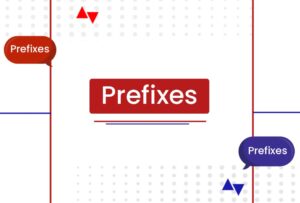Est. reading time: 4 minutes

A vital part of English vocabulary is prefixes, and whether you notice them or not, they are always used in sentences, statements, or articles.
It is important to know how to figure out a prefix in a sentence and how to use it. Once you understand the concept of prefixes, you will be able to use them while developing your vocabulary.
As we go further into the article, we will discuss what prefixes are, examples, and their importance.
What are prefixes?
Prefixes are a type of affix that is added in front of a base word, which could be a noun or any part of speech, thus changing the meaning of the word. You can also say they are morphemes, letters, or groups of letters attached to the front of a base word to modify or change its meaning or grammatical function.
In the English language, prefixes can indicate negation, direction, time, quantity, or other grammatical areas.
There are many prefixes in the English language, each with its own meaning. Understanding what different prefixes mean will help you become familiar with different words and expand your vocabulary.
What are examples of prefixes?
We will take a look at some examples of prefixes in this part of the article. These examples will help you understand how prefixes work.
A-: This prefix means ‘without’ or ‘not’
An example of this is ‘asymmetric’, the base word here is ‘symmetric’, while the prefix is ‘a’. A combination of this means ‘without symmetry’.
Other examples include:
- asexual
- amorphous
- atheism
Un-: This is another prefix that means ‘not’
Examples of these include:
- Unnecessary
- Uncertainty
- Unbelievable
- Unhappy
Bi-: This prefix means ‘two’
- Bisexual
- Binary
- Bicycle
- Biannual
Im-: another prefix that means ‘not’ is ‘im-‘ and here’s how it is attached to the base word
- Impossible
- Impartial
- Imbalance
- Immature
Re-: When joined with a base word, it often means ‘doing something again’. Examples include
- Rebuild
- Rewrite
- Reconnect
Dis/Mis-: These two prefixes usually indicate negation, so when attached to a base word, they form words with negative meanings
Examples are:
- Mistake
- Mislead
- Misappropriation
- Dislike
- Disapprove
- Disrespect
Pre-: This prefix means ‘before’
- Prefix
- Predict
- Preschool
- Precaution
Post-: This means ‘after’
- Postnatal
- Postgraduate
- Posthumous
Anti-: This prefix means ‘against’ or ‘opposite’ and is often used to indicate opposition or counteraction
- Antisocial
- Antidote
- Antibiotics
Trans-: The prefix ‘trans-‘ generally means ‘across’, ‘beyond’, or ‘through’. It often indicates movement from one place, state, or condition to another, or the crossing of boundaries or barriers
- Transcribe
- Transgender
- Transplant
Inter-: This prefix means ‘between’ or ‘among’ and is often used to indicate interaction between two or more entities. Examples include
- Interaction
- Interhouse
- Interconnect
- Intervene
Super-: This could mean ‘beyond’. It is often used to convey superiority, excess, or something that surpasses a normal expectation. Examples include
- Supernatural
- Supermarket
- Superstar
To understand this better, let us take a look at some of these words in a table.
| Prefix | Base word | Result |
| A | Sexual | Asexual |
| Un | Certain | Uncertain |
| Bi | Annual | Biannual |
| Im | Balance | Imbalance |
| Re | Write | Rewrite |
| Dis | Approve | Disapprove |
| Pre | School | Preschool |
| Post | Graduate | Postgraduate |
| Anti | Social | Antisocial |
| Trans | Plant | Transplant |
| Inter | Connect | Interconnect |
| Super | Market | Supermarket |
Why are Prefixes Important?
Understanding prefixes enhances vocabulary comprehension, aids in deciphering unfamiliar words, and facilitates effective communication. In essence, prefixes serve as linguistic building blocks, adding depth to our language.
Shortens words and simplifies communication
When you are in a situation where you need to describe something but want to keep it brief and straightforward, prefixes come in handy.
Instead of using a lengthy phrase or multiple words to convey a specific meaning, you can attach a prefix to a root word to create a single term that conveys the idea concisely.
For instance, instead of saying ‘the act of occurring before something else’, you can simply say ‘pre-occurrence’. By simply adding the prefix ‘pre-‘ to ‘occurrence’, you can explain that something happens beforehand in a single word.
Doing this saves time, space, and effort, making your communication more efficient and easy to understand.
Develops your vocabulary
If you are interested in learning new words and building your vocabulary, trust prefixes to be your buddy. With prefixes, you can derive different words just by adding them to several base words.
Imagine you encounter a new word like ‘cycle’ and you’re curious about getting new words from it. By adding different prefixes to ‘cycle’, such as ‘bi-‘ (meaning two) or ‘tri-‘ (meaning three), you instantly create new words like ‘bicycle’ or ‘tricycle’. Each prefix changes the meaning of the base word, resulting in various vocabulary options.
Furthermore, prefixes aren’t limited to just one base word. You can apply the same prefix to different base words, yielding even more words with related meanings.
For instance, the prefix ‘tele-‘ (meaning distant) can be combined with various base words like ‘phone’, ‘vision’, or ‘communication’, to form words such as ‘telephone’, ‘television’, or ‘telecommunication’.
Improves writing skills
Understanding prefixes and using them in your sentences, writing, or articles will help you improve your writing skills in a way that encourages precise and expressive use of the English language.
Using prefixes allows you to choose the most suitable words to convey your intended meaning accurately. By selecting the appropriate prefix, you can determine the expression of your writing.
For example, instead of using a common term like “happy,” you can opt for a more specific word like “ecstatic” by adding the prefix “ec-” (meaning out) to “static,” thereby conveying a heightened level of joy.
In essence, understanding prefixes and using them in your writing helps you communicate effectively, making your writing more precise and expressive.
Conclusion
In summary, prefixes are essential linguistic components that enhance vocabulary, streamline communication, and deepen language comprehension. Mastering prefixes enables us to express ideas more precisely and efficiently, enriching our linguistic abilities and facilitating clearer communication.

